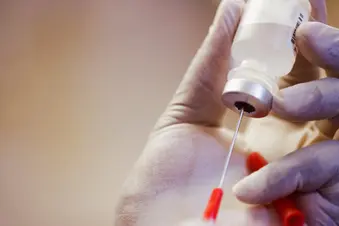
Crohn's disease is a lifelong disorder that causes inflammation in your digestive tract. It may come with symptoms like belly pain, diarrhea, weight loss, and fatigue.
When you have Crohn's, you might have times when you don't notice any symptoms. Then there are periods when the disease flares up. That's when you have symptoms that can range from mild to serious.
Is there anything that can tell you that your Crohn’s is flaring or getting harder to control?
Your Symptoms Change
When your disease is active, you might have:
- Diarrhea
- Cramping and pain in your abdomen
- Fever
- Fatigue
- Blood in your stool
- Weight loss
- Nausea or loss of appetite
- Mouth sores
- Joint pain or soreness
- Red bumps under your skin
If your disease is getting worse, your symptoms may change. They may get worse, or you may get new ones.
For example, you may have:
- A feeling like you’re going to faint
- A weak pulse
- Severe belly pain
- Fever
- Chills with shaking
- Vomiting
See your doctor if you have new symptoms or if any of your familiar symptoms get worse.
Your Treatment Stops Working
There's no cure for Crohn's disease, but there are many treatments. Not all of them work for everyone, but your doctor will team with you to find the plan that will help you. The goal is to slow the inflammation that brings your symptoms and to work toward long-term remission.
It can take some time to find the right medicine or combination of treatments. Sometimes a medicine will work for a while, then stop. Or you may get a new symptom while taking your Crohn's medicine.
If your medicine stops working or you have a new symptom while on treatment, tell your doctor. They can help you find a new treatment plan.
More Complications Crop Up
Crohn's can lead to other serious issues. Hopefully, your treatment will keep your illness from getting worse, but sometimes problems like these can happen:
Bowel obstruction. Crohn's can change the wall of your intestines, causing scar tissue and narrowing. This can block how things flow through your intestines. You might need surgery to get rid of the diseased part of your bowel.
Abscesses. Infections can cause pockets of pus to form and wall off your intestines. They can be treated by draining them and with antibiotics.
Ulcers. Having inflammation all the time can cause open sores called ulcers. They can be in your mouth, your anal area, or your genital area.
Fistulas. Ulcers can sometimes turn into passages that connect parts of the intestine or your intestine with your skin or another organ. These fistulas can become infected and might need antibiotics or surgery.
Anal fissures. These tears in the lining of the anus can cause pain, itching, and bleeding. They're usually treated with creams or sitz baths.
Malnutrition. Because of symptoms like diarrhea and cramping, you may not get enough of the nutrients you need. Your intestines may not absorb enough nutrients, either. This is usually a problem when you’ve had the disease for a long time. You'll need treatment to replace the nutrients you've lost.
Other health problems. Crohn's can cause other issues, including:
- Colon cancer
- Anemia
- Skin problems
- Arthritis
- Liver damage
- Gallstones
- Kidney stones
Emotional Impact
Anxiousness and even depression are a natural response to a flare-up of Crohn’s symptoms. In fact, rates of depression are higher in people with Crohn’s, and anxiety is common as well.
Though you may be able to manage a few days of the blues, it’s important to seek mental health counseling if you feel down or anxious for several weeks at a time or if your symptoms interfere with your home and work life.
Ask for help from family and friends, or seek out community support groups and online chat groups for Crohn’s. You can also try one-on-one mental health therapy. Many resources are available online.
Go to an emergency room if you have any thoughts of suicide, or call the suicide hotline at 800-SUICIDE.
Show Sources
Photo Credit: ER Productions Limited / Getty Images
SOURCES:
Mayo Clinic: "Crohn's disease."
National Institute of Diabetes and Digestive and Kidney Diseases: "Symptoms & Causes of Crohn's Disease."
NorthShore University Health System: "Crohn's Disease."
Crohn's & Colitis Foundation: “Depression and Anxiety,” "What is Crohn's Disease?" "Types of Medications for Crohn's Disease and Ulcerative Colitis," "Intestinal Complications."